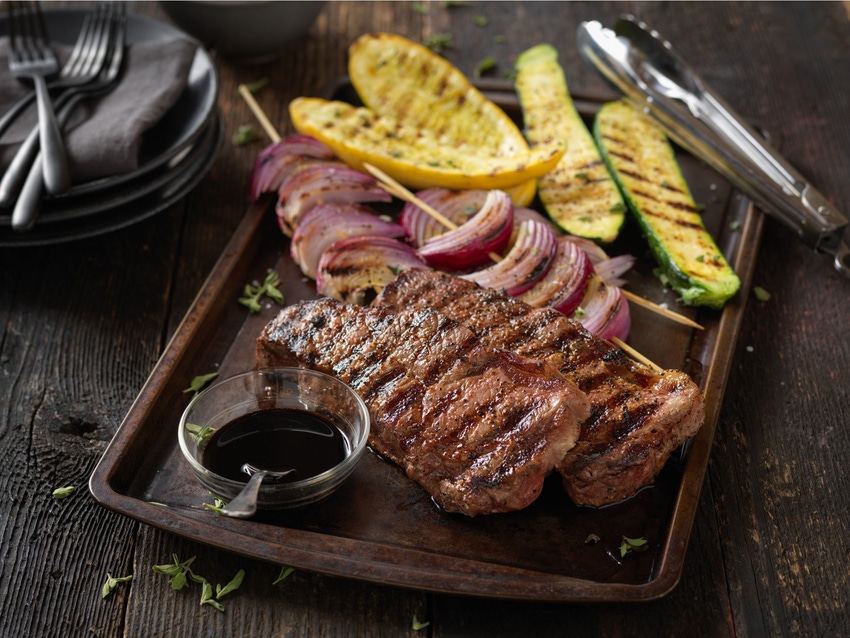Could health care professionals be a key demographic for discussing beef nutrition? New research indicates beef fits in a heart-healthy diet.
October 1, 2018

I recently had a conversation with my grandma about her doctor and the nutritional advice he gave her at her last appointment. She was upset that he told her to reduce her red meat consumption. A lifelong cattle woman with a freezer supply of homegrown beef, she was mad at the advice and wanted me to send her some of my previous blog posts on the topic of beef and heart health.
I sent her a few links and am looking forward to hearing how her next conversation goes with her doctor now that she is equipped with nutritional information that supports beef as part of a heart-healthy diet.
However, it’s frustrating because I know this is a common trend for healthcare professionals to advise their patients to avoid beef
Even more troubling is that the elderly in particular need adequate amounts of protein, which can be sourced from protein-rich beef, to avoid developing sarcopenia (muscle loss). What’s more, beef has been proven to reduce the risk of Alzheimer’s disease and dementia.
READ: Could beef be the perfect food to prevent Alzheimer's?
That’s why I love seeing articles like this one published in the Houston Chronicle titled, “Want a healthier heart? Eat a steak.”
Written by cardiologist Bret Scher, the article explains why this physician goes against conventional wisdom by encouraging his patients to eat the burger, just hold the bun.
Scher writes, “For decades, nutritionists and physicians have urged people to limit consumption of red meat and other fatty foods, which were thought to cause heart disease. But new studies debunk this conventional wisdom. Indeed, it now looks like low-quality carbohydrates — not saturated fats — are driving America's heart disease epidemic. It's time to stop demonizing steak.”
Scher criticizes the American Heart Association (AHA), an organization that frowns upon the saturated fats found in meat, dairy and coconut oil. The AHA recommends if consumers do eat beef, it should be the leanest cut available. In alignment with these recommendations, Beef It’s What’s For Dinner has created “heart-healthy” recipes using lean beef.
READ: How beef benefits heart health, muscle mass & brain function
A diet called Beef in an Optimal Lean Diet (BOLD) gets the Heart-Check certification from the AHA.
According to the Beef It’s What’s For Dinner website, “In a study published in the American Journal of Clinical Nutrition, researchers from Penn State University found that people who participated in the Beef in an Optimal Lean Diet (BOLD) study, consuming lean beef daily as part of a heart-healthy diet, experienced a 10% decline in LDL ‘bad’ cholesterol, and still met targets for saturated fat intake.”
Learn more about it by clicking here.
However, Scher says the “lean” recommendation isn’t necessary and that saturated fats from beef are a beneficial component of a heart-healthy diet.
He says, “In recent years, numerous teams of researchers worldwide have reviewed all the data on saturated fats — and concluded that these fats do not have any effect on cardiovascular mortality.
“A recent, comprehensive review of two dozen high-quality studies conducted by Purdue University researchers found no link between red meat intake and any negative cardiovascular outcome. In a separate 2014 analysis that examined 72 different observational and clinical trials involving more than 650,000 people, the lead researcher concluded that “[I]t’s not saturated fat that we should worry about.’”
Scher shares additional research on how a diet rich in animal fats and proteins can reduce the risk of stroke, reverse Type 2 diabetes, reduce inflammation and lower blood pressure.
He concludes, “Medical experts have long dispensed unproven advice about meat. But newer, better research indicates that red meat and saturated fats aren't harmful when combined with a lower carbohydrate diet. So if you're looking to safeguard your heart, fire up the grill and cook that burger — but skip the bun and the pasta salad.”
The next time you head to the doctor’s office for a checkup, find out their take on beef and the diet. This would be a great opportunity to share the great news about beef as part of a heart-healthy diet with folks who offer nutritional advice to their patients every day.
The opinions of Amanda Radke are not necessarily those of beefmagazine.com or Farm Progress.
About the Author(s)
You May Also Like





